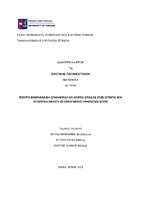Τέταρτη βιομηχανική επανάσταση και αγορές εργασίας στην Ευρώπη : μια συγκριτική μελέτη σε επιλεγμένες ευρωπαϊκές χώρες

View/
Keywords
Ψηφιακός μετασχηματισμός ; Απασχόληση ; Αυτοματοποίηση εργασίας ; Τέταρτη βιομηχανική επανάστασηAbstract
Digital transformation has a profound impact on employment, as it transforms global business operations and economies, leading to multidimensional changes in labour markets, and the emergence of new economic trends. This impact ranges from significant job creation to job displacement and job destruction, and from increasing labour productivity to potentially widening gap of skills and knowledge.
The aim of this thesis is to study and assess the effects of digital transformation and the automation of work, within the context of the Fourth Industrial Revolution (4th I.R.). Initially, an overview of international literature is provided, followed by empirical assessments focused on three European countries, Greece, Belgium, and the United Kingdom. These assessments aim to examine the effects of digital transformation on employment, specifically regarding job dynamics, required knowledge and skills, the varying risks of job loss based on skills, employee income, new forms of work relations, and the policies and factors that contribute to successful adaptation in the labour market and employee response to the challenges posed by the 4th I.R.
The findings indicate the necessity of designing and implementing public policies that prevent the widening of inequalities and the creation of a detrimental cycle involving low education, low incomes, marginalisation and exclusion from the benefits of technological advancements for a substantial number of employees.


